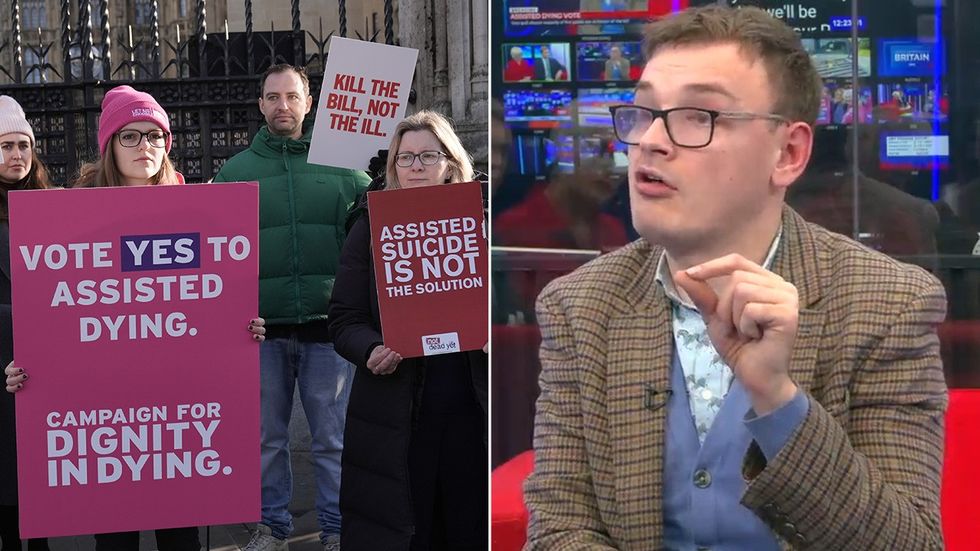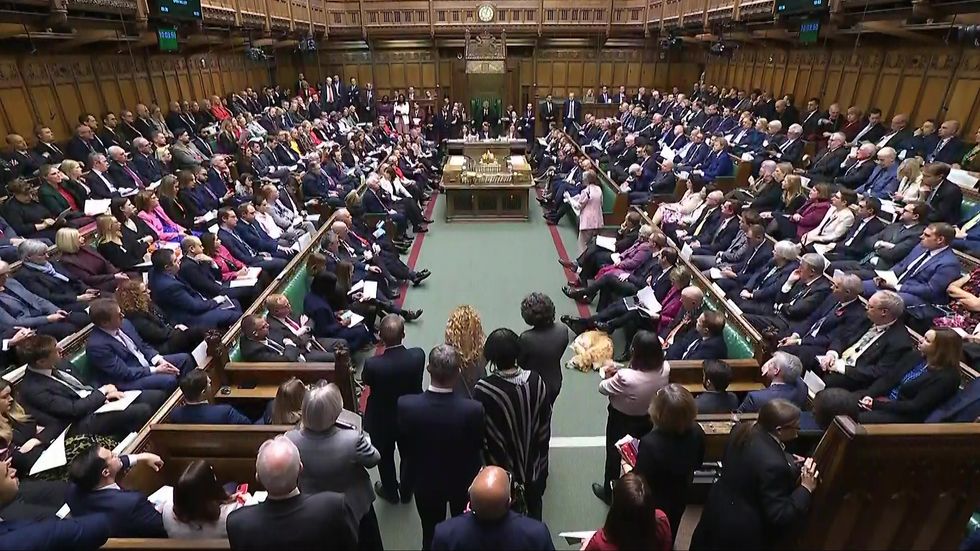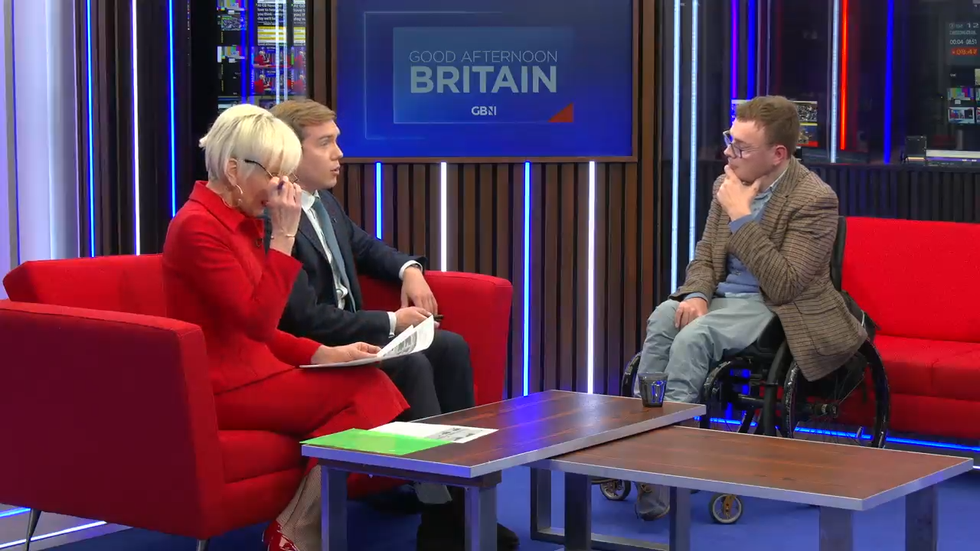Georgia Pearce
Guest Reporter
A disability campaigner has warned against the "dark and dangerous" Assisted Dying Bill being voted on by MPs today, telling GB News that you "cannot legislate pain".
The Bill, fronted by Labour MP Kim Leadbeater, will face a vote today following a debate, in which she affirmed that the legislation offers "dying people autonomy about how they die".
With MPs visibly divided on the bill, campaigner George Fielding told GB News that he is against creating an "ethical burden" and "two-tier system" within a "broken NHS".
Speaking to hosts Dawn Neesom and Charlie Peters in an impassioned interview, Fielding explained that the "consequential and impactful legislation" is essentially "amending the Suicide Act".

Fielding said: "As we see MPs debate what is the most consequential and impactful, dangerous and dark legislation that I have seen be debated in Parliament in my lifetime, let me be very clear as to what people MPs are discussing today.
"They are discussing whether to actually amend the Suicide Act. If this is passed, it would be the first time that we've actually enabled and assisted somebody in their desire to commit suicide. And I genuinely do believe that is the right language to use."
Highlighting the state of the healthcare system in Britain, Fielding urged the government to focus their efforts on "investing in good social care and palliative care" instead of the bill.
Fielding stated: "All of these social systems that we have are broken, and they are social systems that the most vulnerable, disenfranchised and vulnerable and disabled communities rely on day in, day out.

"There are four broken systems which mean that this legislation is unsafe and will always be unsafe. We have a broken NHS.
"I'm not opposing this from a religious perspective, I'm opposing this purely on social justice grounds, that there is no such thing, at this moment in time, as equity in front of our healthcare system."
LATEST DEVELOPMENTS:
Offering his view on how the bill will impact doctors directly, Fielding argued that the legislation creates an "ethical burden" and a "two-tier system" between doctors that are willing to do this for their patients, and those that will not.
Fielding told GB News: "There is no clause in this at the moment to enable doctors to conscientiously object. So what you are doing is you are creating a two-tier system in the NHS, between the doctors that won't and the doctors that will sign it off.
"We're not giving due respect to the fact that this changes the very nature of a doctor's relationship between the doctor and their patient. There is also an ethical burden - The Hippocratic Oath doctors take is to preserve life and alleviate pain, and that's not what doctors will be doing.
"It's not what they came into their job to do. Doctors oppose this, judges oppose this and the disabled community opposes this."

Questioned on Esther Rantzen's campaign in support of the bill, Fielding was pressed on how he would respond to her plea for the legislation to be passed.
Fielding admitted: "I think this is the only issue I've ever disagreed with Esther on, but I would say thank you - because she has started a conversation, as the remarkable campaigner she is, about the most un-British subject, which is death.
"I'm not trying to be too philosophical about it, but we all have a terminal illness - it is called life. There is so much we can do to invest in good palliative care, to invest in a good NHS and invest in social care.
"And in doing so, you will provide better care for everybody. We cannot ever legislate and eliminate pain."
Find Out More...
The Bill, fronted by Labour MP Kim Leadbeater, will face a vote today following a debate, in which she affirmed that the legislation offers "dying people autonomy about how they die".
With MPs visibly divided on the bill, campaigner George Fielding told GB News that he is against creating an "ethical burden" and "two-tier system" within a "broken NHS".
Speaking to hosts Dawn Neesom and Charlie Peters in an impassioned interview, Fielding explained that the "consequential and impactful legislation" is essentially "amending the Suicide Act".

Fielding said: "As we see MPs debate what is the most consequential and impactful, dangerous and dark legislation that I have seen be debated in Parliament in my lifetime, let me be very clear as to what people MPs are discussing today.
"They are discussing whether to actually amend the Suicide Act. If this is passed, it would be the first time that we've actually enabled and assisted somebody in their desire to commit suicide. And I genuinely do believe that is the right language to use."
Highlighting the state of the healthcare system in Britain, Fielding urged the government to focus their efforts on "investing in good social care and palliative care" instead of the bill.
Fielding stated: "All of these social systems that we have are broken, and they are social systems that the most vulnerable, disenfranchised and vulnerable and disabled communities rely on day in, day out.

"There are four broken systems which mean that this legislation is unsafe and will always be unsafe. We have a broken NHS.
"I'm not opposing this from a religious perspective, I'm opposing this purely on social justice grounds, that there is no such thing, at this moment in time, as equity in front of our healthcare system."
LATEST DEVELOPMENTS:
- Labour MP breaks down in tears as she shares 'personal' reason to throw out Assisted Dying Bill
- Dame Andrea Jenkyns reveals Reform defection was MONTHS in the making
- POLL OF THE DAY: Do you fear an assisted dying law could be abused?
Offering his view on how the bill will impact doctors directly, Fielding argued that the legislation creates an "ethical burden" and a "two-tier system" between doctors that are willing to do this for their patients, and those that will not.
Fielding told GB News: "There is no clause in this at the moment to enable doctors to conscientiously object. So what you are doing is you are creating a two-tier system in the NHS, between the doctors that won't and the doctors that will sign it off.
"We're not giving due respect to the fact that this changes the very nature of a doctor's relationship between the doctor and their patient. There is also an ethical burden - The Hippocratic Oath doctors take is to preserve life and alleviate pain, and that's not what doctors will be doing.
"It's not what they came into their job to do. Doctors oppose this, judges oppose this and the disabled community opposes this."

Questioned on Esther Rantzen's campaign in support of the bill, Fielding was pressed on how he would respond to her plea for the legislation to be passed.
Fielding admitted: "I think this is the only issue I've ever disagreed with Esther on, but I would say thank you - because she has started a conversation, as the remarkable campaigner she is, about the most un-British subject, which is death.
"I'm not trying to be too philosophical about it, but we all have a terminal illness - it is called life. There is so much we can do to invest in good palliative care, to invest in a good NHS and invest in social care.
"And in doing so, you will provide better care for everybody. We cannot ever legislate and eliminate pain."
Find Out More...